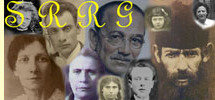




|
"Getting to know more about them" Fischel Reiter--c1840-1921--born in Mielnitza/Mielnica, Galicia, Austria Fischel and his first wife (Chana Ruchel?) had four children. The eldest were Leibish/Louis (1865-1930) and Bela Rivka/Rebecca (1870-1950?), both of whom emigrated to the US. Two others, Rachmiel and Hinde, died when they were pre-teenagers. Fischel's second marriage was to Chana Fleischman. They, too, had several children: Selig, Rachmiel, Chaya, Julius, Hyman, and Lena--perhaps even one more. But the last three were the only children to survive. The mortality rate among women and children (see chapter 4, A more formal history of Galicia) was a daily tragedy, of huge proportions. Fischel descended from Reiters going back to the mid-1700s in Mielnitza (city plot 2 shows a Mendel Reiter). His paternal grandfather, Rachmiel Lieb (1791-1861) had several siblings. Rachmiel Lieb must have been very much loved, because his name continued to be given down through the generations, up to the Holocaust. The Reiters had huge families (see chapter: Family Ancestry). Whenever Lena spoke of her father, it would be longingly, quoting things he said and thought. She kept Fischel's deeply-worn coin purse in her dresser drawer. While Lena looked up to and respected Chana, it was memories of Fischel that made her tearful. Fishel could not read or write, as was the case with most Jews of his generation. He probably came from a long line of tailors and his shop was known in the family and town. It's possible his mother, Itta Elka, was a Blitzer. Adolph's cousin ,Yetta Blitzer, told me I was named Eleanore, (first name) for a very fine person and I believe that was my maternal great grandmother, Elka. She might also have been an aunt or close relative to Nachman, Adolph's father. This is the reason Nachman sent Adolph to apprentice with Fischel. All matters were handled within the "family", (see chapter 4, Life in the Shtetl -- The Home -- Family). Fischel's ancestors could have been chasidic, certainly orthodox, as you can see from his clothes shown in the 1905 tailor shop picture taken in Mielnitza. Standing next to him, dressed in the style of the day, might be his cousin, Hersh Blitzer. Fischel, no longer working, was being supported by his son, Julius. In Europe, the married and unmarried children lived in the parents' home. This was necessary for all kinds of reasons, but especially economics. The parents remained in charge of their lives, maintaining a degree of independence and dignity. Now, in America, Fischel probably lived in the shadow of his sons and made the best of matters to live out his last years, peacefully. He died Holloween, 1921 from a stroke, about age 81.
|
This page is hosted at no cost to the public by JewishGen, Inc., a non-profit corporation. If you feel there is a benefit to you in accessing this site, your JewishGen-erosity is appreciated.
© Copyright 2011 Suchostaw Region Research Group. All rights reserved.
Compiled by Susana Leistner Bloch and Edward Rosenbaum.
Back to SRRG Home Page | Jewish Gen Home Page | KehilaLinks Directory | Gesher Galicia | JewishGen Online Worldwide Burial Registry (JOWBR)
Last updated
02/27/2011 by ELR
Copyright © 2011 SRRG